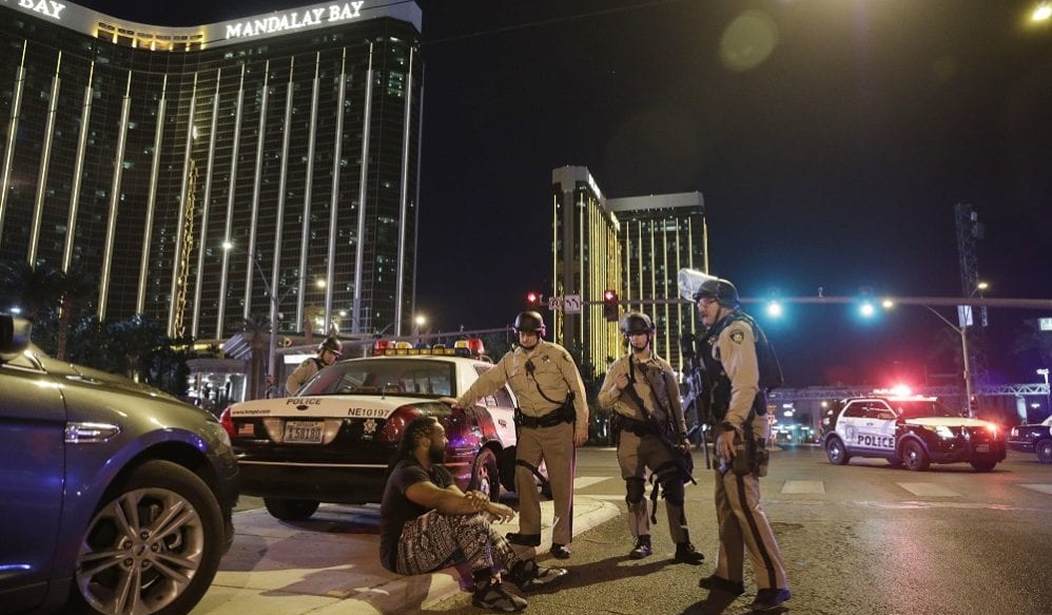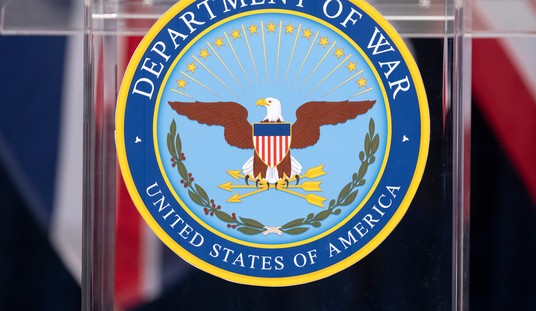
Police officers stand at the scene of a shooting near the Mandalay Bay resort and casino on the Las Vegas Strip, Sunday, Oct. 1, 2017, in Las Vegas. Multiple victims were being transported to hospitals after a shooting late Sunday at a music festival on the Las Vegas Strip. (AP Photo/John Locher)
Yesterday, my colleague Andrea Ruth wrote a very thoughtful piece on the Las Vegas shooting titled Diagnosed or Not, The Vegas Shooting Is About Mental Illness. While I respect her opinion, I’m not in total agreement and, insofar as it applies to the case of the Las Vegas shooting, I’m not in agreement at all.
Mental illness is one of those terms that has gradually become meaningless in the aggregate. While I agree that visible conditions like schizophrenia and dementia (all varieties) are obviously mental health issues, and very serious ones, I’m much less comfortable with the expansion of mental illness to include crappy personalities and anti-social behaviors. Are sociopaths mentally ill? I don’t think so. They are following a behavior strategy that they’ve found to be advantageous. Are alcoholism and drug addiction mental illnesses (the DSM-V says so) or are they character defects? Should alcoholics receive protection under the American with Disabilities Act, just like the person who is confined to wheelchair or who is blind or deaf? The same question applies to addiction to video games and to porn and the ever popular “sex addiction.” Is the fact that ADHD diagnoses are rather routine with young boys a function of rampant mental illness or discipline issues or the fact that school systems would rather drug them into a stupor than deal with them? Is overeating a mental illness? Or is it a manifestation of the sin of Gluttony?
What makes this a philosophical rather that a scientific or medical discussion is there are no clinical, that is laboratory, tests for mental illness. If you deny that an embryo is either alive or a developing human being separate from the mother, I can point you to an unlimited number of tests that prove you shouldn’t go to Cecile Richards for your biology information. If you tell me I’m a sociopath or suffer from attention deficit disorder, you are voicing your opinion based upon your observations derived from your experience and the norms you would expect. None of this is to say mental illness is not very real but that it is damned hard to define. Take, for instance, the very tool we use for diagnosing mental illnesses : the Diagnostic and Statistical Manual, version 5. The DSM-V is based on observations and relies upon the experience of the observer to arrive at a diagnosis. As such, mental health diagnoses are composed of two levels of opinion, that of the clinician and that of the panel which writes the DSM.
For instance, homosexuality was a mental illness until 1974. Then it wasn’t. How can that be? Did we develop a cure? In that same edition of the DSM, gender identity disorder was discovered. Really? Did it suddenly appear? If it wasn’t a mental health issue in 1973, what made it one in 1974? The DSM-V decided that sexual fetishes/deviance are okay unless they harm the self or others. So. one might argue, a person who downloads child porn is mentally ill (because they harm themselves if caught) but someone who merely takes an occasional peak at kiddie port or takes a trip to, say, Cambodia and rents a 10-year-old for sex is not mentally ill (because, arguably, no one is hurt). By what standard were those decisions made?
Taken to its logical conclusion, we are all mentally ill. We all have “borderline personality disorders” of some type. Some of us disguise them better than others. Some of us channel our phobias and manias and addictions into socially constructive directions. Some of us don’t. The fact that we behave in ways that may not be healthy for us or for the people around us does not, in my view, a mental illness make.
As a commuter who logs in at least 2 hours and 40 minutes on trains and subways each working day of the year, I do a lot of reading. One series of books that I enjoyed reading was by a guy named Robert Tannenbaum. They are all court room focused. I don’t usually rely upon popular novelists to provide me with my intellectual content, but the issue of mass shootings has always caused me to remember this one short passage. The set up is that a totally psychopathic killer is on the verge of convincing the legal system that he’s actually mentally ill. The psychiatrist here is a survivor of Treblinka who is talking about crime and mental illness.
“[Y]ou would be surprised how little real mental illness there is in the world. And of that, how little is associated with criminal behavior. Irrationality, we have, plenty. And evil, oh my, we have enough, more than enough of that. But the poor crazy people: They suffer, you understand? They can barely take care of themselves. Plot a crime? Nonsense! They cannot do it Oh, perhaps, in a frenzy they hurt someone, yes, but as I say, this is rare.
“…[W]hen I was much younger, I had the opportunity to observe, at close hand, a great deal of criminal behavior, people being murdered and tortured, robbed, and so on. And afterward, when people said, ‘This was madness, this was insanity,’ I would say, ‘No, it was not. Evil, surely. Hate and greed, yes, lust for power, yes, fear, perhaps. But not insane. This is a libel on the poor madmen.”
I think when we go down the road of excusing behavior by labeling it mental illness–and make no mistake about it, the moment we label something as mental illness we are transferring no little part of the responsibility from the criminal to the disease–we are likewise going down the road of denying that evil actually exists.
We don’t like to deal with concept of evil because we inhabit a secular and post-Christian nation where speaking of moral absolutes gets you laughed at by the right class of people. We look to our new god, science, and its minion, medicine, to explain everything. I think that is a mistake. Evil doesn’t subject itself to laboratory analysis. Grants are not awarded to study evil. But evil exists because man has Free Will (or agency, if you are a secularist).
I don’t know what happened in Las Vegas. What I do know is this. The killer had led a functioning, even moderately successful, life. He functioned well enough in society that he fooled his family and never came into conflict with authorities. The attack shows a high degree of planning. Moreover, the killer planned on dying in the attack as he made no plan or attempt to escape and anticipated his own death by setting up cameras so he could watch as police closed in on him. To me, this all says that this was a man who was obsessed and possessed by an impulse to kill a large number of other people before taking his own life.
While we should all be concerned about mental illness and the difficulty in getting real mental health treatment and the impact that mental health issues can have on a person’s life, let’s not lose sight of the fact that there are many more evil people in the world than there are people suffering from mental illness. When we conflate the two we trivialize both.
What happened in Las Vegas was evil, not illness. Let’s not be afraid to call it that.













Join the conversation as a VIP Member